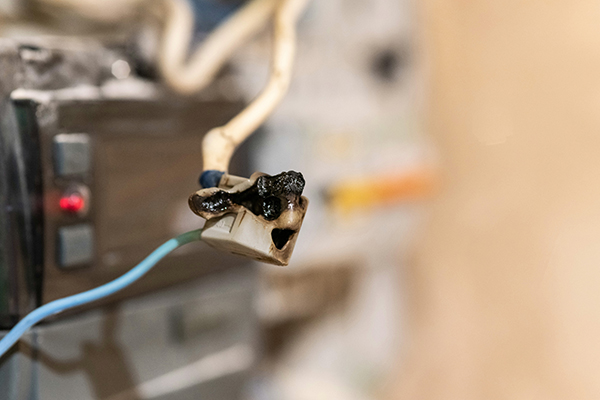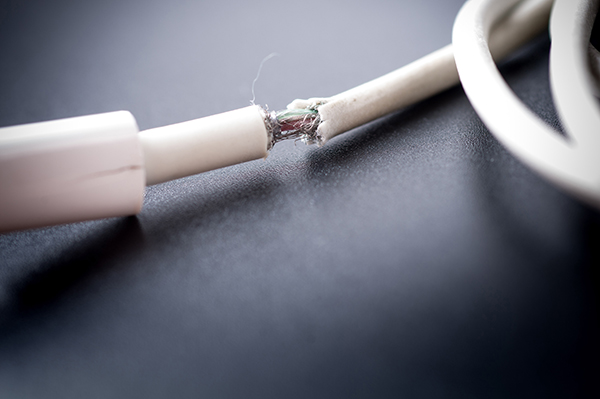
The 3 Most Common and Dangerous Electrical Hazards at Home
Electricity plays a vital role in domestic life. It not only provides light and heat but powers the numerous appliances we use daily.
We’ve become so dependent on electrical energy as an essential part of modern life that we take it for granted. However, along with all the benefits of electricity come potentially lethal dangers such as fire and electric shock.
Electrical fires are a leading cause of house blazes in Australia, and electric shock kills scores of people every year. This makes it crucial to be able to spot the warning signs of domestic electrical hazards before disaster strikes.
In this post, we’ll look at the common causes of electrical problems in the home and how you can identify them before it’s too late. You’ll also discover steps you can take to avoid or deal with these household electrical dangers.
Circuit Overload

Circuit overloads are among the domestic electrical hazards that are a major cause of house fires.
Circuits and electrical sockets can only cope with a limited amount of electricity. An overload occurs when too many appliances or gadgets are plugged into an outlet.
Signs of Circuit Overload
Signs of a circuit overload include:
- Circuit breaker that keeps tripping, resulting in power cutting out at home.
- Flickering or dimming lights, especially when you switch on appliances or more lights.
- Buzzing sounds from switches or sockets.
- Switch or outlet covers that become warm.
- Smell of burning from sockets or switches.
- Scorch marks on outlets or plugs.
- Lack of power in appliances.
- Sluggish electronics.
- Slight shock or a tingling sensation when you touch appliances, sockets or switches.
How to avoid a circuit overload
You can help to prevent a circuit overload by avoiding plugging multiple appliances into the same outlet or circuit.
Take special care with appliances that draw 1,000 watts or more, such as:
- Heaters.
- Fridges.
- Vacuum cleaners.
- Air conditioners.
You can find out how much power your appliances use by referring to the manufacturer’s manual.
Other measures you can take to prevent overloading a circuit include:
- Making sure cords on appliances are in good condition.
- Not using extension leads for appliances.
- Only plugging one heat-producing appliance into an outlet at a time.
- Unplugging anything you’re not using.
- Positioning kitchen appliances like coffee machines and toasters so they don’t run off one outlet.
The long-term solution to a circuit overload may entail calling in an electrician to run new dedicated circuits to the largest loads or redistribute loads to other general-purpose circuits.
Faulty wiring

Electrical wiring systems are subject to wear and tear over time and can put your family and your property in danger through increased risk of fire.
Much of your home’s wiring will be concealed in spaces between floors or behind walls, so it can be difficult to identify potential issues.
Signs of Faulty Wiring
However, there are some visible signs your house may need rewiring, including:
- Lights playing up. Lighting circuits have a low power rating, and lights that flicker or dim are often the first signs of faulty wiring.
- Burning smell – when wiring heats up to the extent that it melts the plastic sheathing. This means imminent risk of fire, and you need to call an electrician immediately for advice.
- Electric shocks. A tingle or shock from an outlet as you plug in an appliance is another warning sign of a major wiring issue, and it needs immediate professional attention.
- Persistent breaker tripping.
- Sockets and switch cover plates getting hot.
Solutions for Faulty Wiring
If you notice any signs of faulty wiring, it’s crucial to take action. A qualified electrician can help with the following:
- Conducting a thorough electrical safety inspection.
- Performing a detailed risk assessment to identify potential hazards.
- Determining if your home requires rewiring
Short circuits
Electricity flows along the path of least resistance, and if it can find a shorter route it’ll take it, immediately changing course to head to ground.
Short circuits are a domestic electrical hazard that can result in fire, electrical shock, and damage to appliances.
Causes of Short Circuits
Causes of problems like a shorting-out power socket include:
- Rats or mice chewing through wires.
- Wiring getting wet.
- Loose connections in an electrical box.
- Old or damaged outlets or appliances.
- Screws or nails penetrating through walls and damaging wires.
- Deterioration of cable sheathing.
- Build-up or surges of electricity.
A clear indication that a circuit has shorted is when the circuit breaker trips, resulting in power cutting out at home. You may also see sparks and a bright flash or hear a boom or zapping sound.
Apart from the risk of electrical shock, if you come into contact with a short circuit, you may get burnt from the intense heat.
Solution for Short Circuits
Short circuits can be prevented by:
- Checking outlets for loose connections.
- Checking appliances for damage before plugging them in.
- Keeping electrical usage to a minimum during a lightning storm.
- Scheduling an annual, professional electrical inspection.
Getting Professional Help to Prevent Electrical Hazards
Power use in modern homes has risen significantly over the years, which potentially poses greater risks.
Domestic electrical hazards can be life-threatening, and pinpointing the cause can be difficult. Flickering lights or problems with outlets or switches, for example, could indicate an overloaded circuit or defective wiring.
If you can detect indications of issues with electrical systems, you can call in professional help to protect your family from the hazards of potentially fatal electric shock or outbreak of electrical fire. This avoids the inherent danger of misguided DIY attempts to fix electrical hazards, which can in itself be dangerous as well as making the situation even worse.
Identifying electrical issues and repairing or replacing any part of your home’s electrical system – from a shorting-out power socket to a complete rewire – calls for extreme caution and is best left to a qualified electrician.

